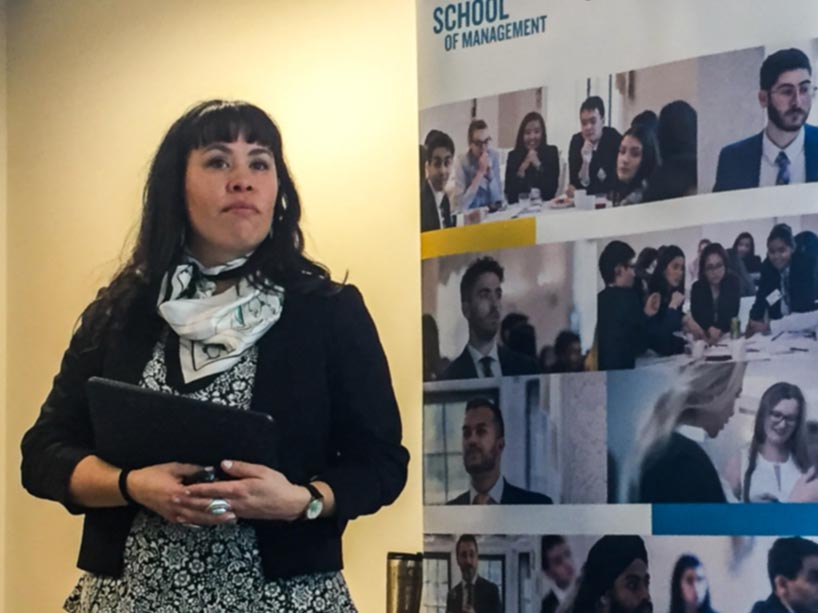How Coast Salish gathering feasts nourish their economy

Dara Kelly, professor of Indigenous business at Simon Fraser University’s Beedie School of Business, delivers her guest lecture, “Illuminating Coast Salish economy of affection” at the Ted Rogers School of Management.
The fact that Toronto is located within the “Dish With One Spoon Territory” tied in perfectly with professor Dara Kelly (external link) ’s guest lecture, “Illuminating Coast Salish economy of affection” at the Ted Rogers School of Management, February 7.
“What a suitable metaphor to open up a discussion about feasting economies,” said Kelly, professor of Indigenous business at Simon Fraser University’s Beedie School of Business (external link) .
Kelly is from the Leq’á:mel First Nation, part of the Stó:lō Coast Salish, an Indigenous community located in the Fraser River and south Vancouver Island area of B.C.
Kelly noted that her role as a professor of Indigenous business is a groundbreaking one – the first time a position like this has existed in North America.
“It is exciting because it’s showing there’s a shift within the discipline of business to be open to bringing in the philosophies and principles of Indigenous economics,” she said. “My research has sought to explore economic development under the assumption that the Coast Salish economy is not inherently an economy similar to what we have now, rather, it’s a people-centred economy that nurtures interconnection, belonging and inter-generational well-being.”
Kelly outlined the ways in which Coast Salish communities – which date back up to 15,000 years – use gathering ceremonies to mark economic exchange.
“Whenever we had important business to tend to, a feast would be necessary to conduct, record, and legitimate transactions. A fundamental principle of these feasts is the notion of the redistribution of wealth.”
These ceremonies came to an abrupt end in 1876 with the enforcement of the Potlatch Ban, an extension of Canada’s Indian Act.
“Applied across Canada for 76 years, the ban was a very clear oppressive measure to make sure Indigenous Peoples across the country were not hosting large gatherings, feasts, ceremonies,” she said. “It was an intervention on the Indigenous economies.”
Three generations were denied this fundamental tradition before the ban was lifted in 1951, which sparked a resurgence of the potlatch along the coast of B.C., Kelly noted. She linked the effects of this ban to the Coast Salish philosophies of freedom and unfreedom. Freedom refers to the capability of Coast Salish people to express spirituality, governance, leadership and economy in gatherings. Unfreedoms relate to barriers to those capabilities, such as the ban.
Central to Kelly’s research is the concept of an economy of affection.
“At a basic level, care and affection form the bedrock of the human experience. Without it, we would die,” she said. “Care and affection serve as a long term and intuitive driver for exchange that aligns the means and ends of economic development.”
As affection is an English word, Kelly spoke about replacing the word affection with something that aligns with Coast Salish philosophy. She outlined the seven Coast Salish spirit entities – including Swia’m (talent, power), Syúwél (guardian spirits), and others – and said Shxwelí (soul, spirit, life force) was the closest equivalent to the word affection.
She explained that the Coast Salish economy of Shxwelí focuses on the ends of economic development, rather than the means, the ends being connections to others, to ancestors, to the river environment, to the Creator.
Kelly discussed some of the key concepts underlying the Coast Salish economy of affection, including:
- Relative poverty – Someone can be poor in circumstance but rich in family, time, food and community. “The notion of being impoverished in a dominant society is relative – relative to who your neighbours are, and how you see yourself in relation to what’s outside your community.”
- Syóyes (work) – The work done in ceremonies ranges from the invitations, the sacred role of fire keeper, cooking, ceremonial prayers, speaking, gifting and witnessing – remembering and sharing stories with the next generation.
- Debt – Kelly described debt as the measure of a thriving Coast Salish economy. “It’s usually laden with negative connotations, but in this case the notion of debt is a signal to the good relationships you’ve built. There are families who trust you and who you trust as well.”
- Banking – This refers to investing in the people around you, said Kelly. “Bank your resources in your community members in order to ensure if you come into a time of hardship, you are able to access those relationships when you need them.”
During her talk, Kelly reminded the audience of a quote from Th’eláchiyatel, Chief Richard Malloway. “Always feed your guests. When you do that, you’ll never go hungry.”
“By feeding the people through collective ceremonial and spiritual feasting, Coast Salish will never go hungry,” she said. “And our survival is assured through interconnectedness, care, affection, reciprocity and belonging.”
This guest lecture was co-sponsored by the Law & Business Department and the Ted Rogers Leadership Centre. The event aligns with Ryerson’s goal to learn directly from Aboriginal knowledge keepers, academics and community members, in an ongoing effort to prioritize and value Indigenous teachings, voices and research. The report Truth and Reconciliation at Ryerson: Building a Foundation for Generations to Come, outlines other key priorities.
